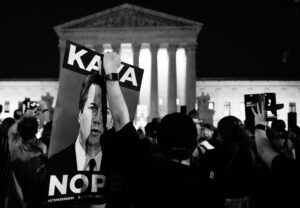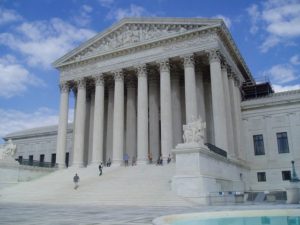Historian Howard Zinn Warned Us About the Supreme Court
On the heels of Kavanaugh's confirmation, we must remind ourselves that the words 'Equal Justice Before the Law' have always been a sham. Author Howard Zinn, left, during a panel with actor Viggo Mortensen for "The People Speak." (Michael Dwyer / AP)
Author Howard Zinn, left, during a panel with actor Viggo Mortensen for "The People Speak." (Michael Dwyer / AP)
These are the facts. The Senate majority, which the Republican Party currently holds with 51 seats, presently represents 44 percent of the country’s population. Following Brett Kavanaugh’s confirmation, four of the Supreme Court’s nine justices have been appointed by presidents who lost the popular vote. Two of those justices attended the same D.C.-area prep school.
If the United States government faces a legitimacy crisis, it’s one that has been building for 18 years, if not longer than that. In 2000’s Bush v. Gore decision, five conservative justices determined that Florida could not conduct a recount of its heavily disputed election results—a decision that effectively handed the presidency to the Republican candidate. “Although we may never know with complete certainty the identity of the winner of this year’s Presidential election, the identity of the loser is perfectly clear,” John Paul Stevens, who was appointed by Gerald Ford, wrote in his dissent. “It is the Nation’s confidence in the judge as an impartial guardian of the rule of law.”
The naked politicization of the judiciary did not escape historian Howard Zinn. In 2005, after another former member of the Federalist Society, John Roberts, became the 17th chief justice of the United States, the activist and professor issued a warning to progressives about the power of the high court—one they might be wise to revisit on the heels of Kavanaugh’s ascension.
“It would be naive to depend on the Supreme Court to defend the rights of poor people, women, people of color, dissenters of all kinds,” he wrote. “Those rights only come alive when citizens organize, protest, demonstrate, strike, boycott, rebel, and violate the law in order to uphold justice.”
Zinn also took aim at Democrats and Republicans’ collective fetishization of the “rule of law,” a phrase that Kavanaugh invoked more than once while rebutting multiple allegations of sexual assault before the Senate Judiciary Committee. As America’s own history reveals, no law is inherently just, nor does it command the divine authority of a king’s mandate.
“The Constitution gave no rights to working people: no right to work less than twelve hours a day, no right to a living wage, no right to safe working conditions,” he continued. “Workers had to organize, go on strike, defy the law, the courts, the police, create a great movement which won the eight-hour day, and caused such commotion that Congress was forced to pass a minimum wage law, and Social Security, and unemployment insurance.”
The piece concludes with a call to action, one entirely true to Zinn’s canonical “A People’s History of the United States.” The legal system cannot determine our country’s trajectory, and we have more power than either we realize or acknowledge.
“The courts have never been on the side of justice, only moving a few degrees one way or the other, unless pushed by the people,” he observed. “Those words engraved in the marble of the Supreme Court, ‘Equal Justice Before the Law,’ have always been a sham.”
“No Supreme Court, liberal or conservative, will stop the war in Iraq, or redistribute the wealth of this country, or establish free medical care for every human being. Such fundamental change will depend, the experience of the past suggests, on the actions of an aroused citizenry, demanding that the promise of the Declaration of Independence—an equal right to life, liberty, and the pursuit of happiness—be fulfilled.”
Read Zinn’s piece in its entirety at The Progressive.
Correction: An earlier version of this post indicated that the Republican Senate majority represents 18 percent of the population. While that is the smallest number of constituents a party can have while still controlling the Senate, the present majority represents 44 percent of the population. Truthdig regrets the error.
Your support matters…Independent journalism is under threat and overshadowed by heavily funded mainstream media.
You can help level the playing field. Become a member.
Your tax-deductible contribution keeps us digging beneath the headlines to give you thought-provoking, investigative reporting and analysis that unearths what's really happening- without compromise.
Give today to support our courageous, independent journalists.






You need to be a supporter to comment.
There are currently no responses to this article.
Be the first to respond.